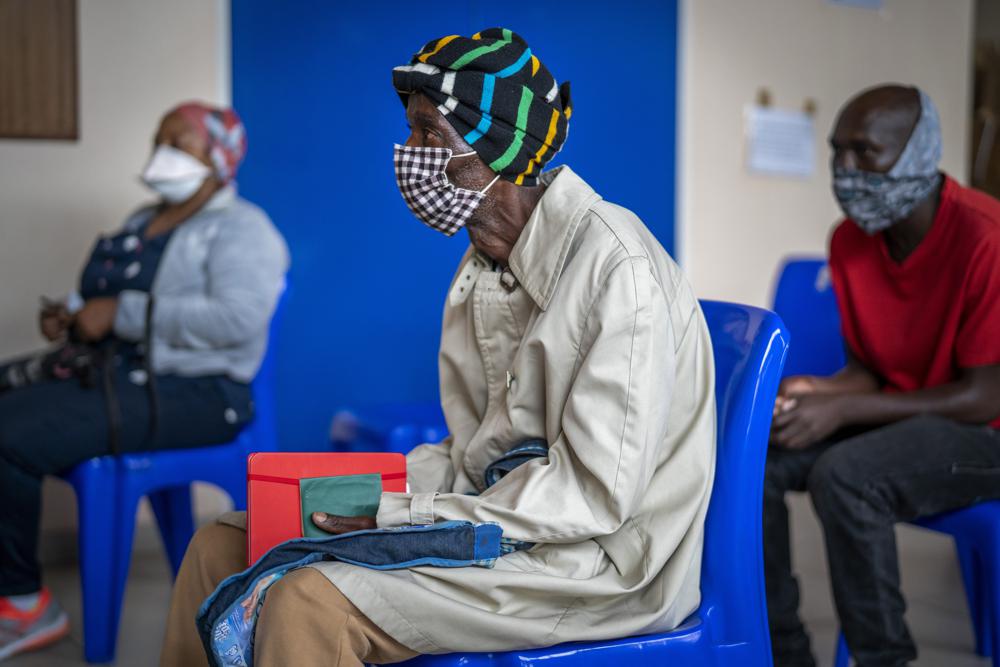People wait for COVID-19 vaccination at Soweto’s Baragwanath hospital Monday Dec. 13, 2021. South Africa’s 7-day rolling average of daily new COVID-19 cases has risen over the past two weeks from 7.60 new cases per 100,000 people on Nov. 28 to 32.71 new cases per 100,000 people on Dec. 12, according to Johns Hopkins University. In general, the new omicron cases have resulted in milder cases, with fewer hospitalizations and less severe cases requiring oxygen or intensive care. (AP Photo/Jerome Delay)
JOHANNESBURG (AP) — A two-dose Pfizer/BioNTech vaccination provides just 33% protection against infection by the omicron variant of the coronavirus, but 70% protection against hospitalization, according to a large-scale analysis in South Africa released Tuesday.
The first large-scale analysis of vaccine effectiveness in the region where the new variant was discovered appears to support early indications that omicron is more easily transmissible and that the Pfizer shot isn’t as effective in protecting against infection as it was against the delta variant.
The analysis was based on more than 211,000 positive COVID-19 test results, 41% from adults who had received two doses of the Pfizer vaccine. About 78,000 of these positive COVID-19 test results between Nov. 15 and Dec. 7 were attributed to omicron infections. The study was carried out by Discovery Health, South Africa’s largest private health insurer, and the South African Medical Research Council.
The study has been carried out in the weeks since omicron was first announced in November by scientists in South Africa and Botswana. The researchers emphasized that its findings are preliminary and not peer reviewed.
The data are gathered from the first three weeks of South Africa’s omicron-driven wave and may change as time passes. South Africa is the first country to experience a surge in COVID-19 driven by the omicron variant.
South Africa has experienced rapid community spread — concentrated in its most populous province, Gauteng — dominated by the omicron variant.
The seven-day rolling average of daily new cases in South Africa has risen over the past two weeks from 8.07 new cases per 100,000 people on Nov. 29 to 34.37 new cases per 100,000 people on Dec. 13, according to Johns Hopkins University. The death rate hasn’t increased during that same period.
“Superb genetic surveillance by the Network for Genomic Surveillance in South Africa identified that omicron infection accounts for over 90% of new infections in South Africa, and has displaced the formerly dominant delta variant,” Discovery Health chief executive Dr. Ryan Noach said.
“The omicron-driven fourth wave has a significantly steeper trajectory of new infections relative to prior waves. National data show an exponential increase in both new infections and test positivity rates during the first three weeks of this wave, indicating a highly transmissible variant with rapid community spread of infection,” Noach said.
The result shows that vaccinated individuals who received two doses of the Pfizer vaccine have 33% protection against infection from omicron, relative to those who were unvaccinated in the first weeks of South Africa’s current omicron-driven wave. This represents a significant drop from the 80% protection against infection afforded during the earlier period, probably on the basis of lower antibody susceptibility, following the extensive spike protein mutations in the omicron variant.
Encouragingly though, the result shows that these same vaccinated individuals who received two doses of the Pfizer vaccine have 70% protection against hospital admission in this same time period. This protection against hospital admission is reduced from the highs of 93% in South Africa’s delta-driven variant.
The study shows that the protection against hospital admission is maintained across all ages, in people from 18 to 79 years old, with slightly lower levels of protection for older people, with 67% in people age 60 to 69 and 60% for people age 70 to 79. Protection against admission is also consistent across a range of chronic illnesses including diabetes, hypertension, hypercholesterolemia, and other cardiovascular diseases.
The study also found:
- Omicron poses a higher risk of reinfection. For individuals who have previously had COVID-19, the risk of reinfection with omicron is significantly higher than that of earlier variants.
- Risk of hospitalization from omicron is lower. Hospital admissions among adults diagnosed with COVID-19 attributed to omicron is 29% lower compared to the COVID-19 wave that South Africa experienced in mid-2020, after adjusting for vaccination status.
The result shows that vaccinated individuals who received two doses of the Pfizer vaccine have 33% protection against infection from omicron, relative to those who were unvaccinated in the first weeks of South Africa’s current omicron-driven wave. This represents a significant drop from the 80% protection against infection afforded during the earlier period, probably on the basis of lower antibody susceptibility, following the extensive spike protein mutations in the omicron variant.
Encouragingly though, the result shows that these same vaccinated individuals who received two doses of the Pfizer vaccine have 70% protection against hospital admission in this same time period. This protection against hospital admission is reduced from the highs of 93% in South Africa’s delta-driven variant.
The study shows that the protection against hospital admission is maintained across all ages, in people from 18 to 79 years old, with slightly lower levels of protection for older people, with 67% in people age 60 to 69 and 60% for people age 70 to 79. Protection against admission is also consistent across a range of chronic illnesses including diabetes, hypertension, hypercholesterolemia, and other cardiovascular diseases.
The study also found:
- Omicron poses a higher risk of reinfection. For individuals who have previously had COVID-19, the risk of reinfection with omicron is significantly higher than that of earlier variants.
- Risk of hospitalization from omicron is lower. Hospital admissions among adults diagnosed with COVID-19 attributed to omicron is 29% lower compared to the COVID-19 wave that South Africa experienced in mid-2020, after adjusting for vaccination status.
Copyright 2021 Associated Press. All rights reserved.




























